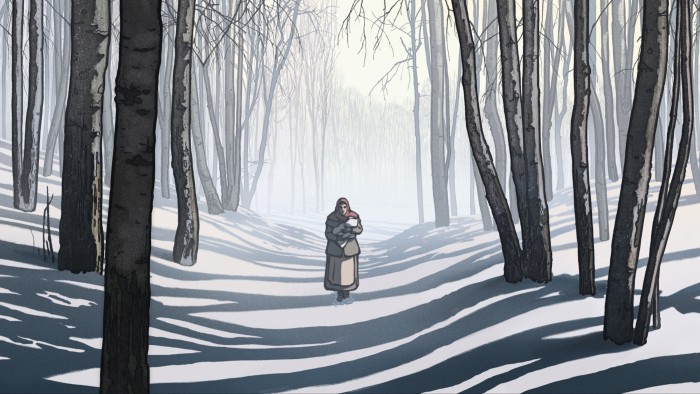Stay informed with free updates
Simply sign up to the Film myFT Digest — delivered directly to your inbox.
Best known for his Oscar-winning silent comedy The Artist, French director Michel Hazanavicius has a reputation for somewhat impersonal flipness — his last film, Final Cut, was a redundant remake of a Japanese zombie comedy. But there is no doubting the sincerity or the ambition of his first animation feature, The Most Precious of Cargoes.
This French-language Holocaust story is based on a book by Jean-Claude Grumberg, who has also co-written the script with Hazanavicius. The film presents itself as a fairytale, its opening voiceover beginning, “Once upon a time . . . ” The setting is eastern Europe during the second world war: in a bleak winter landscape live an ageing, childless couple, known only as Woodcutter and Woodcutter’s Wife. The Wife often visits the nearby railway line to pray to the “gods” of the train that regularly passes by. One day, she finds an unexpected bounty: a baby girl lying in the snow. The fact that its swaddling is a Jewish prayer shawl — its gold thread standing out, a glimmer of brightness in a colour-muted world — provides a clue to the train’s terrible destination.
The Wife adopts the child, against the wishes of her scowling husband, who sees it as one of the accursed “Heartless”. But exposure to this gurgling infant soon overcomes his resistance, and sets him at odds with his malign, antisemitic workmates.
The film is beautifully executed. The animation is by Julien Grande, working from Hazanavicius’s character drawings, and there is a sombre grace in the heavy lines of the landscapes and figures, as well as in the softer textures: the snowfall, the light filtering through the trees. There is a similar clarity and directness in the voice performances: Dominique Blanc and Grégory Gadebois as the couple, Denis Podalydès as a war-scarred neighbour. The drily ironic tone of the voiceover narration is given philosophical authority by the late, revered Jean-Louis Trintignant: a clever, poignant coda puts a self-reflexive twist on the fairytale element, in a succinct, sobering rejoinder to Holocaust denial.
Yet for all the film’s impeccably serious intentions, there is something deeply uncomfortable about it. Hazanavicius awkwardly attempts to counterpoint severity and sentiment, with the baby’s bonny cheeks and delighted gurgle worked relentlessly as signifiers of redemptive joy. And, towards the end, the film surely crosses a line when it takes us directly into the inferno of Auschwitz in a way that feels ill-judged and intrusive. Alexandre Desplat’s score hardly helps, with its excessive twinkle and its coy klezmer borrowings.
Fictional depictions of the Shoah are always bound to raise questions of the ethics of representation — and not all Holocaust films can match the provocative rigour of The Zone of Interest. The Most Precious of Cargoes can be admired for its artistic ambition, and will certainly be of educational value for younger viewers, disturbing content notwithstanding. But it makes some glaring mis-steps in crossing the frontier of overstatement and kitsch; the elegance of its aesthetics only makes the problem more evident.
★★★☆☆
In UK cinemas from April 4
Read the full article here

